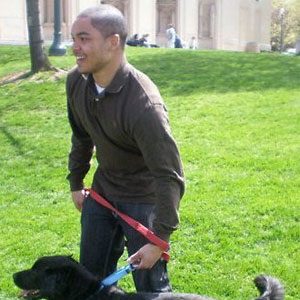
Kamal Ibrahim (S 2011)
Andrew Carnegie Scholar, vice president of the Alpha Phi Alpha fraternity
Bio
Knocking on opportunity's door
Kamal Ibrahim is a firm believer that everything happens for a reason. But make no mistake — he hasn't stood idly by to let fate take the reins. From graduating near the top of his class at a public school in Harlem to accepting a job at PNC Bank months before graduating from Carnegie Mellon, Ibrahim has worked hard to accomplish his dreams.
"My high school wasn't the best of high schools. It was one of those inner-city, low-income high schools in Manhattan. There wasn't really anything I could do about that but make the best of the situation and get accepted to CMU," said Ibrahim.
Ibrahim's stellar academic performance and acceptance to Carnegie Mellon was highlighted in a 2007 New York Daily News series tracing the journeys of 23 classmates who tested into a gifted kindergarten at Harlem's Public School 36 in 1994. While some students like Ibrahim remained in the public school system, others enrolled in private schools or dropped out after becoming teenage parents, joining gangs or encountering school violence. Ibrahim's parents both dropped out of high school and established strict rules for their children with hopes that hard work and a high school education would lead to better opportunities than they had for themselves.
During his four years at Carnegie Mellon, Ibrahim has definitely gotten the most out of every opportunity that has come his way. Now a senior mathematical sciences major with a focus in operations research, he has already accepted a job at PNC Bank as a business analyst and plans to pursue an MBA.
"One thing I've learned is it's the effort that you put into your work that matters. That's what CMU really teaches you — that you just have to work hard, no matter what it is."
Ibrahim is currently an intern in the credit risk department at PNC Bank, using his mathematical training to help upper-level management and systems engineers create new technology that will allow the bank to keep track of and assess credit risk while complying with new government mandates.
Originally hired as a summer intern at PNC, Ibrahim has continued his internship through his senior year so that he could learn about the inner-workings of corporate technology as he gears up to start working full time after graduation.
Ibrahim also explored the operations research field as an intern at Princeton University. During his summer at Princeton, he worked with Professor William Massey to design computer programs to simulate the behavior of infinite server queuing models. He also worked at Princeton's MIRTHE Center, a National Science Foundation Engineering Research Center, where he applied operations research principles to physics, mapping the behavior of photons in quantum cascade lasers.
"When I had a few internship options, I did them all. I know that sounds crazy," joked Ibrahim.
But for Ibrahim, it's just another instance of getting the most out of his college experience.
"I've taken classes in almost every discipline-except music. I'm not even a little bit good at music," he concedes.
Although his internship and his class schedule keep him busy, Ibrahim also is deeply involved with campus life. He is an Andrew Carnegie Scholar, the vice president of the Alpha Phi Alpha fraternity, and the fundraising chair of the National Society of Black Engineers. During his junior year, he served as the co-leader of COMPASS, an MCS mentoring program for first-year minority students. Ibrahim joined COMPASS his first year at Carnegie Mellon, and he received invaluable support from his mentor, alumna Betty Mbom.
"Betty made sure she called me every day, and she always encouraged me to ask for help if I needed it. It was really important for me to learn that sometimes you can't do everything and you don't know everything, no matter how smart you are. Always look for help."
As he prepares to graduate in May and begin his job at PNC Bank, Ibrahim looks back at his experiences at Carnegie Mellon as "one big turning point."
"What Carnegie Mellon really is — at its core — is this mix where students have the option to do everything. I've learned that you just have to work hard, and you can do anything."